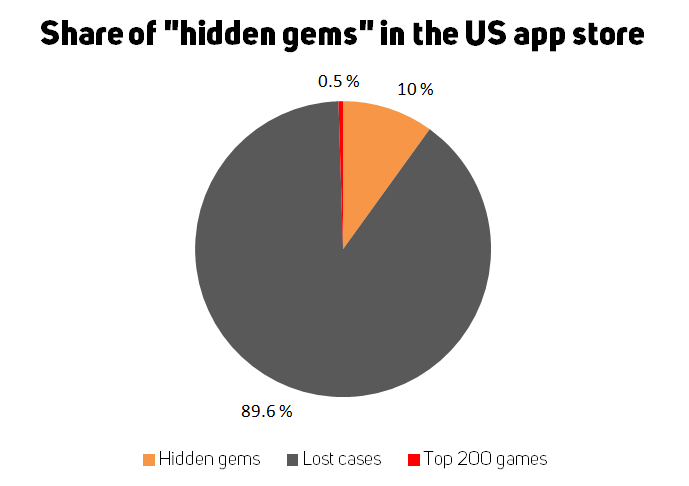3 Ways Predictive Analytics Will Change Mobile Games – PART II
In the previous part of this blog series, I wrote how predictive analytics is going to help game developers to use their development resources more efficiently. This second part focuses on the benefits predictive analytics is going to bring to players and smaller developers.
2. There will be more games that players love to play
We made recently a survey asking players what type of games they would like to spend more time playing. We also scanned the AppStore to see how the current offering of games matches these needs. The findings were quite interesting…
Game developers will understand the players better…
For example, 23% of players in US said that they are willing to spend time on RPG games and we forecast that this will be even higher in the future. However, less than 10% of AppStore games are these type of games. On the other hand about 40% of games in the AppStore require sensomotoric skills from the player (e.g. react fast to events in the game), but only 7% of players prefer to play this type of games. Predictive analytics can be used to predict trends in the market and using this information, developers can focus on games that players not only want to play now, but also in the future. This is, of course, good for developers, but also for the players.
40% of games in the AppStore require sensomotoric skills from the player (e.g. react fast to events in the game), but only 7% of players prefer to play this type of games
…and the game itself will understand players’ needs
The other area in which predictive modeling is going to help in matching the game experience to players’ needs is in tailoring the gaming experience according to the player needs. For example, if you are a gamer that hates in-app purchases, it is better to offer you something compared to a player that has no problem of spending dozens of dollars to decorative items. Predicting the needs of the player based on their behavior is already a reality for the bigger game studios, but in the near future we’ll see more and more easy-to-use tools suitable also for smaller companies – tools that are giving the game itself AI and ability to adapt players’ needs.
3. Those who earn the success will get it
One of the biggest challenges in the mobile game industry is the difficulty of seeing he potential of the game before it is launched. The success seems to be random and this is has led to an unfair situation for many game developers.
There are over 3000 hidden gems in the market
If the investor or publisher doesn’t have ways to assess the potential of the product reliably, they will use secondary pieces of information like experience of the team for example from PC or console games. Based on our database of hundreds of games and developers, we have found that this type of experience is a poor indicator to predict the success in the current mobile game market. The situation is unfair for the most of the small game developers that might have really high potential games in the development pipeline, but lack the ways to convince investors or publishers. In fact, based on our recent study we found that over 10% of the 300.000+ mobile games in the AppStore have hidden potential and would be great games to invest in – this is over 3000 lost hidden gems!

If and when predictive analytics is going to be available for wider audience, the transparency will increase and the success will follow those who would earn it.
What to do to be prepared
Predictive analytics has changed many industries and the gaming industry will not be an exception. Here is a couple of tips so that you could be better prepared for it:
- Embrace fact-based decision-making culture: this lowers the barrier of trying and using new services that can be game changers for your company.
- Don’t forget creativity: fact-based company culture doesn’t mean that you should not value creativity. The most highly performing teams we have worked with are strong in both; they are super creative but use facts to guide their creativeness into the right direction.
- Don’t try to get all the facts you need by yourself. If you know what you need, there are already service providers that can help you in providing you the information you need, by using predictive analytics. Predictive analytics is a field that is developing fast so that if your company doesn’t have a full-time analyst it is probably better to outsource it
- GameRefinery can help you to predict and optimize your games’ or game concepts’ commercial potential before soft launch. Clients that use the services include many experienced game developers, but also new promising start-ups.
- A couple of great tools that are worth checking are: deltaDNA and Omniata.




















